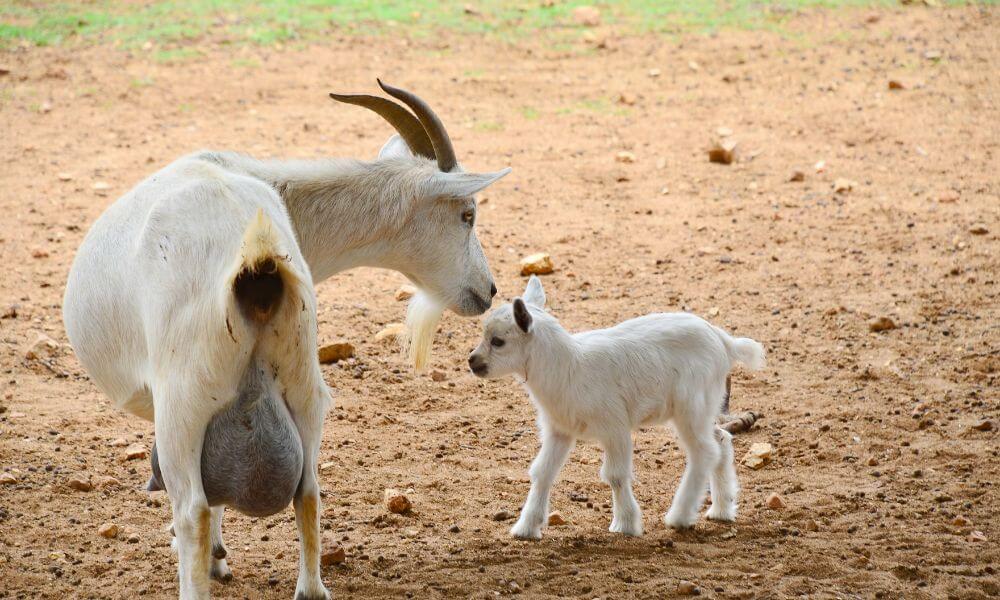Having little goats on the way can be one of the most exciting things about owning goats.
Adding new members to the herd and getting to fawn over adorable baby goats is loads of fun for you and the herd.
But it can also be a daunting experience if it’s your first time, and there are a lot of questions you want answered—like how long their labor lasts.
Like human labor, you’re going to be in for the long haul.
You’ll want to be with your goat throughout the labor where possible, to make sure everything is going smoothly.
If you’re inexperienced, you should have a vet or experienced companion with you.
Let’s look further into this.

How long does it take for a goat to give birth?
First and foremost, I want to make the point that it can and will vary a good deal.
A good benchmark is 12 hours.
Your goat will most likely be in labor for around this amount of time.
It could be longer; it could be shorter—it’s best to prepare yourself to be down for up to 15 or 16 hours.
But this is the whole labor.
This is from the moment that your goat’s water breaks to the time that it has passed its placenta, stood back up, and begun grooming the kids.
This will take somewhere in the region of 12 hours.
In terms of the actual birth, or delivery, the moment where the kids come out, this will be much shorter.
This is usually over in around half an hour, depending on the size of the litter.
A typical birth will involve twins—this is more common than a single kid.
This will take around half an hour if not shorter.
Larger goats may be a bit quicker giving birth than smaller breeds, though.
Though this might sound counterintuitive, smaller breeds of animals generally have a harder time giving birth.
So, expect to be with your goat for upwards of 12 hours.
Expect to deliver up to three goats during half an hour of that 12 hours.
How do you tell if a goat is having contractions?
The first signs will be in their basic behavior.
They will appear restless and will be constantly looking back at their sides.
You’ll want to keep a close eye on your goat’s behavior in the weeks leading up to the due date.
She will paw at her bedding, and the final sign will be white discharge emerging from the vulva.
The vulva itself will then become flabby, and the goat will lift her tail.
During this, she will be very vocal, making a lot of noise.
The muscles around the tail will then relax and they will feel much softer to the touch as she prepares to deliver the baby.
At this stage, you know that the contractions have begun and she is going into labor properly.
As I said, the delivery itself will be very short—so how can you tell your goat is done giving birth?
How do I know if my goat is done giving birth?
As I said, in almost all cases, your goat will at least give birth to twins.
Triplets are not uncommon.
Single kids are relatively rare, though not impossible.
So, expect to be delivering at least twins.
Getting an ultrasound with a vet before birth can be helpful to know what to expect.
When she has delivered a kid, you can feel in front of her udder to see if there are still kids in the uterus.
If there seems to be a bony mass moving inside the goat, then there are still kids to come.
Check this again after she has delivered another kid.
Once you feel the uterus soft and bouncy almost, you can be sure that she has finished delivering.
This doesn’t mean the process of labor is over, though.
She will still have to pass the placenta, so look out for that.
Once she has stood up and started suckling the kids and cleaning them off, the labor is over.
Do you have to help a goat give birth?
Yes, you do.
You’ll want to be there with her even if nothing goes wrong just to be sure that everything is going smoothly.
You shouldn’t need to put your hands inside her or anything like that, just be present and make sure everything is going smoothly and she is comfortable.
If you’ve no experience delivering goat kids, then you should have someone experienced with you.
Ideally, a vet in case anything goes wrong.
You don’t want to be panicking with a newborn kid to deal with.
So, yes, you do need to help your goat.
Giving birth is a big process for your goat, then, and you’ll want to be ready to notice all the important signs well in advance.
When the time comes, you’ll want to be totally confident of what you’re doing—even if that just means calling your friend to help you out.
Your goat shouldn’t have a problem giving birth, but you want to be ready to be there for it.
